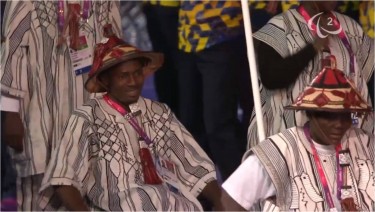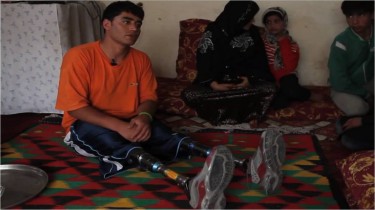This post is part of our special coverage London 2012 Olympics.
[All links forward to French articles unless otherwise stated]
From August 29 until September 12, 2012, 4,200 athletes from 166 countries will take part in the 14th edition of the Paralympic Games in London and will compete in twenty disciplines.
Here is a video presenting the Paralympic Games by paralympicSportTv [en]:
The organizers needed 15 days after the London 2012 Olympics to rearrange and make infrastructures accessible.
Charles El Meliani on JOL press writes that a record number of tickets were sold for these games:
Londres a fait des efforts colossaux en matière de billetterie, mettant sans cesse en avant les Jeux paralympiques dans tous ses points de vente. Avec un résultat impressionnant : au total, ce sont déjà près de 2,3 millions de tickets qui ont trouvé preneur. Sur 2,5 millions mis en vente. En bref, ces Jeux pourraient bien se dérouler à guichets fermés : exceptionnel.

The Burkina Faso delegation during the opening ceremony of the Paralympic Games. Screenshot of a video of the ceremony provided by paralympicSportTv
The competing athletes are not all born with disabilities. Jacqueline Mallet on the blog ‘Province de l'équateur’ explains and illustrates some remarkable stories in the following post ‘“I was given up for dead”: the incredible destiny of disabled athletes‘:
Certains de ces sportifs ont grandi avec leur handicap, tandis que d’autres ont dû apprendre à le surmonter à la suite d’une guerre ou d’un accident. Frappés par le destin, ils ont trouvé dans le sport un moyen de se reconstruire.
Mallet also writes about the journey of several athletes: Martine Wright, a survivor of the London bombings; Derek Derenalagi, a soldier born in Fiji, given up for dead; Rim Ju Song, the first North Korean participant who, a few months ago, could not swim; and Hassiem Achmat, who survived a shark attack.
Another blog post entitled ‘A war mutilated Afghan en route to the London Games …‘ shares the story of Malek Mohammad, an Afghan athlete who lost both his legs in 2005 when he stepped on a land mine near his home in Kabul.

Afghan swimmer Malek Mohamed at home before the Paralympic Games. Screenshot of a video of Malek Mohamed provided by AFP on Youtube
In the blog post ‘Once a war victim, now a paralympic hero‘ [en], Damon van der Linde in Freetown, Sierra Leone, tells us about the story of Mohamed Kamara who was only four years old when he was captured by rebels during the civil war. They eventually cut off one of his arms during his captivity.
On the France Handicap Info website, Stéphane Lagoutière writes:
L'autre grande star de ces jeux seront bien sur les déficients mentaux, avec un retour après 12 ans d'absence.
In France, only a regional television channel will broadcast all of the events.
On Twitter, user @ThePositive1 posted a picture of the Jamaican team.
This post is part of our special coverage London 2012 Olympics.






